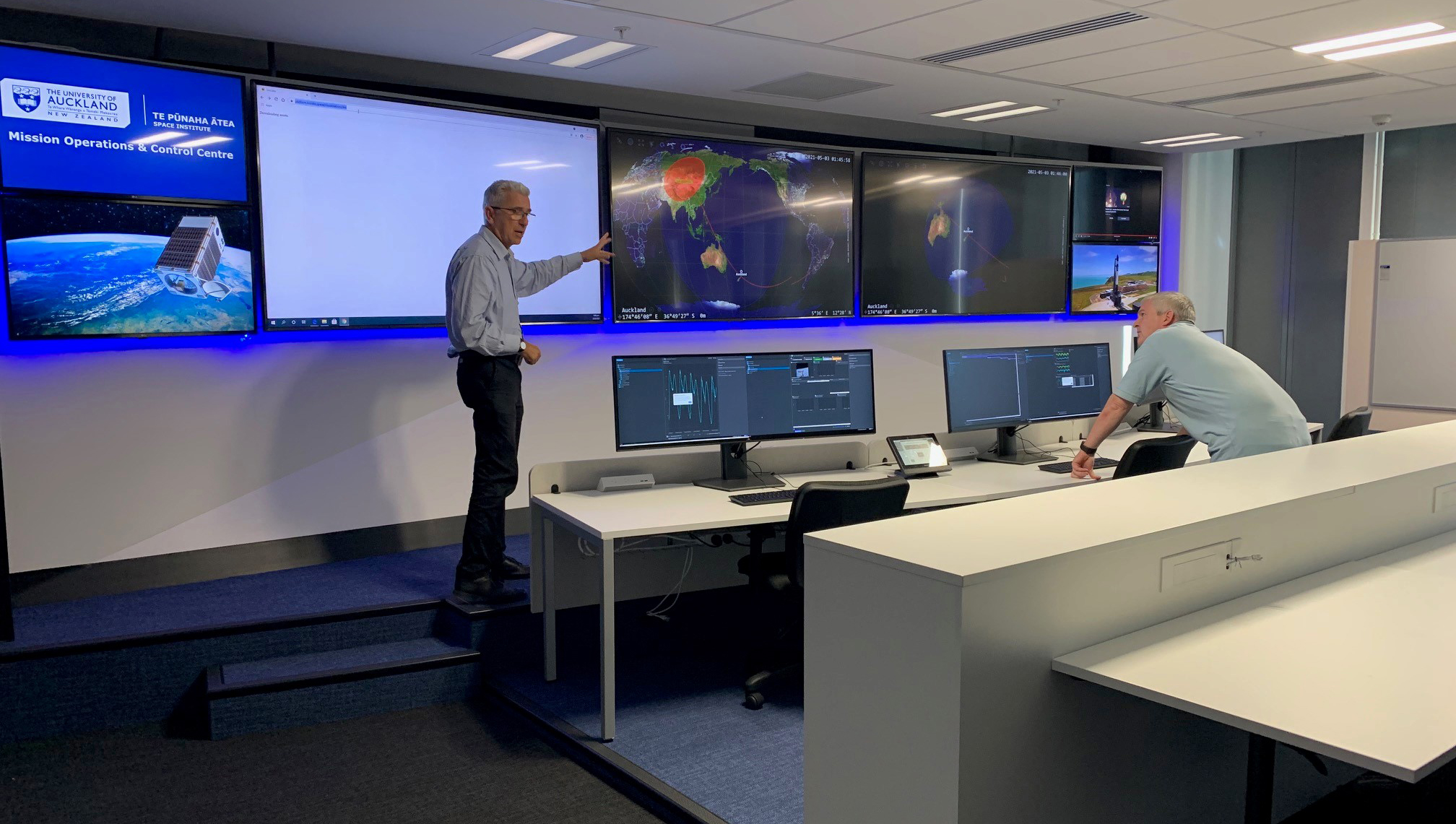University partners with industry to grow space workforce
The New Zealand space industry is taking off in a massive way, but to be the brightest star in the NZ$647 billion global space economy we need skilled workers. Te Pūnaha Ātea – Space Institute, at the University of Auckland is helping to address that need by offering courses that will shape New Zealand’s next generation of space scientists and engineers.
On this page

Guglielmo Aglietti and Chris Jackson showing off Auckland's brand new mission operations centre which will be used for a range of missions including MethaneSAT.
Launched in 2016 as the Auckland Program for Space Systems (APSS) in response to a growing interest in satellite technologies within the University, the Institute’s main aim is to foster the growth of New Zealand’s space sector, carry out applied research and educational activities, and develop and test new space technologies.
In just a few years APSS, now Te Pūnaha Ātea – Space Institute, has become a multidisciplinary hub of expertise in space science and engineering, including a capability to oversee space missions and develop applications.
Core staff now includes more than 25 researchers, technical and professional staff, as well as students from undergraduate level and above engaging in Institute-led aerospace research projects. Staff also collaborate with multi-disciplinary researchers across the University who have an interest in space activities.
New ideas and products with commercial potential
The Institute has a strong focus on connecting with industry and sharing ideas to build a workforce capable of working across a range of space-related areas. Describing the alignment between research, education and industrial activities as crucial, Prof Guglielmo Aglietti, Director Te Pūnaha Ātea - Space Institute, describes universities as a favourable environment to generate new ideas and products with commercial potential.
“These companies will grow and will end up sponsoring research at the University, so you’ll have a whole ecosystem that really works very well.”
A good example of this synergy is the partnership with NewSpace Systems, who are supporting two Institute researchers, and have recently set up a subsidiary of the South African headquartered company in New Zealand. NewSpace’s Managing Director Mark Honeth says:
“Collaborating with the Institute not only benefits the company by providing access to state-of-the-art facilities and world-class researchers, but also allows the company to plough hard-won industrial knowledge back into educating the next generation of space engineers.”
Host for MethaneSAT mission control centre
The Institute was chosen to host the mission control centre for MethaneSAT, New Zealand's first official government-funded space mission. MethaneSAT is a state-of-the-art satellite designed to detect global methane emissions with unprecedented accuracy. The mission is due to launch in 2022 and will play a significant role in the global effort to combat climate change.
The Institute is also establishing a range of complementary facilities to support end-to-end development and in-orbit demonstration of space technologies. State-of-the-art facilities will include specialist labs and workshops to manufacture and assemble hardware concepts, a 50 m2 clean room where flight hardware will be assembled and functionally tested, and an environmental test facility to validate the capability of hardware to withstand the launch and in-orbit environment. After launch, the space hardware will be operated in space using the Mission Operations Centre that will also support the ongoing operation of MethaneSAT.
“This is will enable us to develop and provide in-orbit demonstrations of new space technologies and applications that will grow the NZ share of the international space sector.” says Prof Aglietti.
Read more about the MethaneSAT space mission
First to offer Master of Aerospace Engineering
Another first for the Institute, and New Zealand, is a dedicated Master of Aerospace Engineering programme designed to equip students with the skills, knowledge and expertise to excel in a field of national and global economic significance. An important component of the programme involves students partnering with industry to work on real-life aerospace projects.
Prof Aglietti describes the project component as a bridge between academia and industry that helps students to transition from education to jobs in industry, whilst giving companies access to a pool of talent to expand their workforce.
“Our students, supported by academic staff and the whole university infrastructure can work on real projects of interest for our industrial partners, co-supervised by their staff.”
“It’s a win-win situation for everyone. The more qualified people we have, who have real-life expertise, the more the sector grows.”
The Institute also offers Certificate and Diploma courses in aerospace engineering which can serve as pathways towards the master’s degree.

